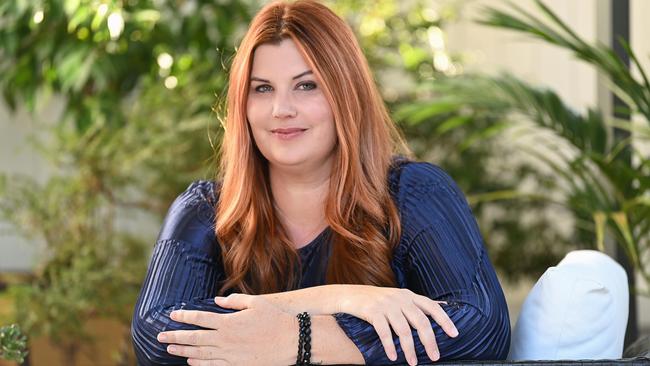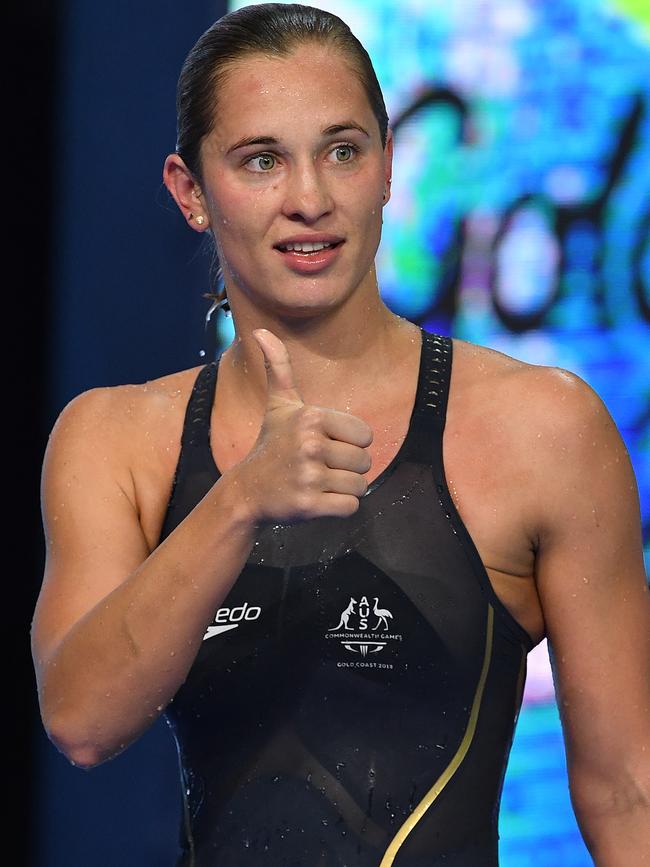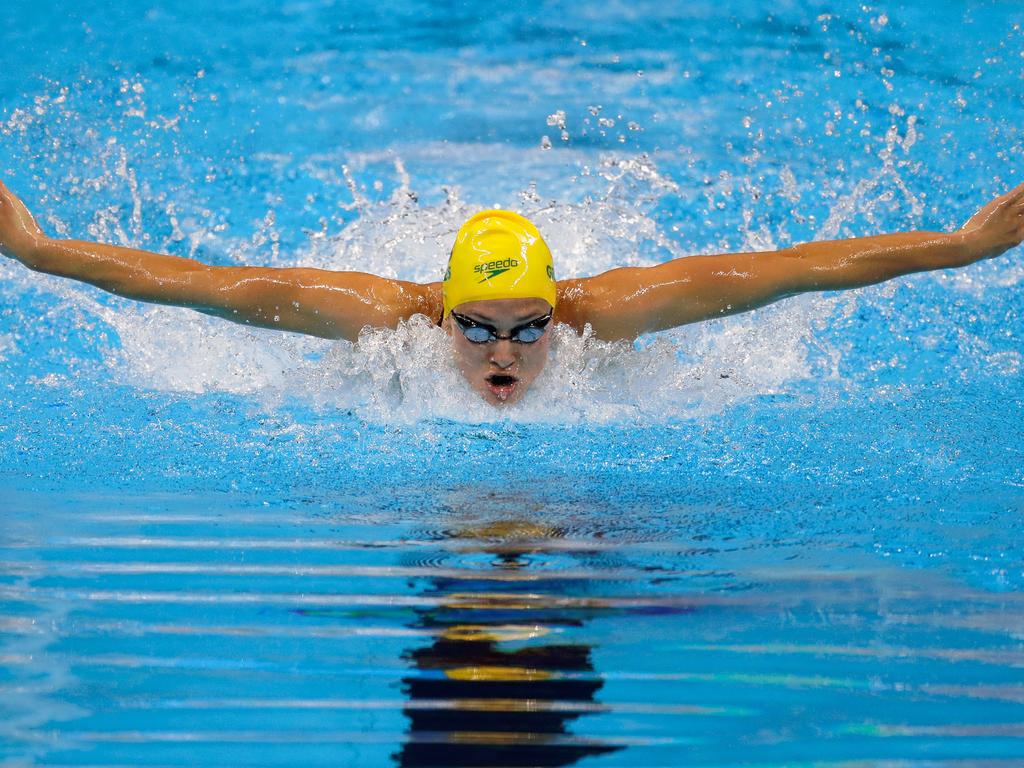Olympic coach ‘humiliates’ teen boy by forcing him to wear girl’s swimmers
Female swimmers are ‘oinked at’ while one Olympic coach ‘humiliates’ boys by making them wear female bathers.

Young female swimmers are “oinked at”, told to get “boob reductions” and dubbed “lard arses” while The Australian can reveal one Olympics swim coach makes boys wear girl’s bathers if they swim “too slow”.
Australian swimming’s “degrading and abusive” culture has been exposed by 14 years of cultural research conducted by former elite swimmer Jenny McMahon (OAM), who has uncovered a pattern of destructive swim coach practices.
Dr McMahon, a Commonwealth Games gold medallist and senior academic at the University of Tasmania, interviewed hundreds of elite swimmers and coaches from 2007 to now and found widespread “toxic coaching” habits have left both men and women psychologically damaged after their time in the sport.
“It’s a patriarchal, male-dominated culture, with a guru-fixation – it’s dysfunctional,” Dr McMahon said.
“It looks like all smiles, gold medals and PBs to the outsider, but it leaves a trail of broken athletes and coaches when they do not conform and perform.”
The Australian on Saturday was contacted by a concerned parent who provided a photograph of an Olympics swim coach’s “humiliating ritual” where a teenage boy was recently made to wear a girl’s swimming costume at an elite swimming squad.
“The boy did not achieve the time he was asked to do in training and the coach demanded he get out of the pool and put a pair of female bathers on, because he was ‘training like a girl’, in front of the rest of the squad and for the remainder of the session,” the parent, who wanted to remain anonymous, said.
“It was a humiliating experience for him while other swimmers, some of whom are Olympians, looked on and giggled.”

The boy’s coach is currently on pool deck at the Australian swim team trials in Adelaide and has represented Australia as a team coach on numerous occasions.
There’s been criticism of Swimming Australia’s announcement it will do an “independent” review into the sport’s treatment of “women and girls” following Olympian Maddie Groves social media claims that the sport was rife with sexism, misogyny and body shaming.
It is unclear whether the review will look at historic episodes.
Swimming Australia board director Tracy Stockwell has been announced as leading an “independent” all-female panel.
Dr McMahon, who also says swimming’s reporting system is broken, believes that the Australian Human Rights Commission should oversee an independent review of the sport, as they did with gymnastics. “I think Swimming Australia needs to be proactive like gymnastics in Australia and bring in the Human Rights Commission to conduct a review,” Dr McMahon said. “Gymnastics said ‘Let’s look at the past and the present and look at how it can inform the future to ensure safety and compliance with Human Rights principles’.
“Swimming Australia needs to consider that it is more than just women’s and girls’ issues, as stated by their CEO Alex Baumann.
“It is very narrow-minded to think it is just about women, women’s health and body shaming – this is about systemic and cultural issues in swimming. It’s not just about Maddie Groves.
“Also, Swimming Australia president Kieren Perkins says he cannot act on Maddie’s claims without knowing more.
“ I am happy to provide the findings of my 14 years of research into Australian swimming culture and how it does not align with the International Olympic Committee’s guidelines of safe sport.”
Dr McMahon, who experienced brutal coaching practices as a member of the Australian swimming team amid a decorated career that left her with severe mental health issues, including suffering an eating disorder and in turn later battling drug addiction, has devoted her life to researching the sport’s culture.
Her research has revealed:
• An 11-year-old was made to run 10km as punishment because she was caught eating an ice cream by her coach;
• Swimmers in a leading high-performance squad were weighed weekly and made to run 16km if they put on weight, 4km if they hadn’t;
• Female swimmers were told they were “getting a lard arse”;
• Coaches have oinked (made pig noises) at swimmers if they perceived them to be overweight;
• A coach told a swimmer to “get a boob reduction because your tits are too big”;
• Coaches have told swimmers (aged 12 to 13 years old) that if they get their period, they “will grow boobs and get a big bum and swim slow”;
• A swimmer said her coach said her “bum looked bigger by just looking at her” even though her weight had not changed;
• There was an overwhelming culture of coaches constantly “looking up and down” and “judging” swimmers’ bodies, as well as advocating extreme diets (soup diets, diet-shake diets);
• The common coaching practice of “hell weeks” is destructive.
“Hell weeks” are where athletes are subjected to heavy training volumes. Athletes as young as 10 have been subjected to these unscientifically supported training regimes, and many have reported getting injured, fainting and becoming ill.
Dr McMahon, an international award-winning abuse researcher who has received funding from the IOC to develop abuse education, said there were “good” coaches who called out the toxic behaviour to the SA hierarchy but they had been “ostracised” for doing so.
Meanwhile, those swimmers who had reported incidents to Swimming Australia confided to Dr McMahon that “nothing has eventuated” from their complaints.
“And the coach concerned often keeps coaching while the swimmer is often ostracised or kicked out for speaking up,” she said.
Those close to Groves say she did not go through the formal SA complaints process because she did not “trust” the organisation.
“My research found swimmers are scared to report because they do not trust Swimming Australia; who can blame them when the process is done in-house?” Dr McMahon said.
“Some swimmers … told me they have had to report with their coach/abuser present … not to mention that the Swimming Australia landline, which is listed, is not even manned.
“The IOC and Sports Integrity Australia recommend independent authorities should handle the reporting and that sporting organisations should not investigate themselves.”
Swimming Australia has not signed up to SIA – the government’s new independent complaints handling process that was launched in March – and is understood to be working through all the requirements needed to comply.
Dr McMahon’s research shows “abused swimmers in Australian swim culture” often end up with a litany of issues, including:
• Long-term eating disorders. One Olympics swimmer learned to become bulimic on the Australian swim team and was still bulimic 20 years later, excessively weighed themselves post-sport, used diet pills and suffered body dysmorphia.
• Anxiety, depression and other mental health issues;
• Addiction to drugs and the misuse of alcohol;
• Re-victimisation – swimmers who were abused choose abusive partners.
Dr McMahon, who won Commonwealth Games gold and silver in 1990, “truly” understands that athletes must work hard to be successful but she says they also must be able to train and compete in a safe environment.
“I am not saying elite athletes do not have to work hard,” she said. “To be an elite athlete, you have to give your life, but you have to be able to do it in a safe environment without fear and ridicule and without the long-term health consequences that follow.”
Several elite swimmers, male and female, have spoken about their eating issues in the sport. They include high-profile Olympians such as Daniel Kowalski (bulimia), Cate Campbell, Leisel Jones, Emily Seebohm and Libby Trickett.
At 15 and chosen on her first Australian team, Dr McMahon was subjected to a torment of daily weigh-ins, weekly skin-fold testing, psychological abuse and non-contact physical abuse.
“It took me so long to realise I had suffered abuse on the Australian swimming team and at the point when I was swimming, I would have said ‘Throw everything at me’,” she said.
“There will be so many swimmers out there like that today.
“Then there are some swimmers, like Maddie Groves, who have worked it out.”








To join the conversation, please log in. Don't have an account? Register
Join the conversation, you are commenting as Logout